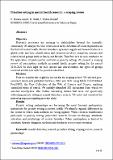Por favor, use este identificador para citar o enlazar a este item:
http://hdl.handle.net/10261/267223COMPARTIR / EXPORTAR:
 SHARE SHARE
 CORE
BASE CORE
BASE
|
|
| Visualizar otros formatos: MARC | Dublin Core | RDF | ORE | MODS | METS | DIDL | DATACITE | |

| Título: | Priorities setting in mental health research: a scoping review |
Autor: | Benito, Carlos; Güell, E.; Molas Gallart, Jordi CSIC ORCID | Palabras clave: | Mental disorders Research priorities setting Scoping review Research partnerships |
Fecha de publicación: | 4-abr-2022 | Editor: | MedRxiv | Citación: | Benito, Carlos; Güell, E.; Molas Gallart, Jordi; 2022; Priorities setting in mental health research: a scoping review [preprint]; MedRxiv; https://doi.org/10.1101/2022.04.04.22273381 | Resumen: | [Objective] Research processes are opening to stakeholders beyond the scientific community. We analyse the user involvement in the definition of research priorities in the field of mental health. Mental disorders represent a significant disease burden at a global scale and their identification and treatment involves caregivers, patients and related social groups such as family and friends. Therefore it is an area conducive to the application of participatory methods in priority setting. We present a scoping review of participatory methods in mental health priority setting for the period 2010-2020 to shed light on their spread and characteristics, the types of groups involved and the link with the priorities identified. [Methods] First we describe the eligibility criteria for the scoping review. We selected peer-reviewed documents published between 2010 and 2020 using MEDLINE/PubMed, PsycINFO, the Core Collection of the Web of Science and Scopus, applying controlled terms of search. We initially identified 330 documents from which we selected seventy-four after further discarding studies that were not specifically addressing priority setting in mental disorders research. We noted and classified the interest groups participating in every study. [Results] Priority setting partnerships are becoming the most frequent participatory instruments for priority setting in mental health. We identify regional differences in the extent to which such methods are being applied. When research beneficiaries participate in priority setting, prioritised research focuses on therapy, standards, education and psychology of mental disorders. When participation is limited to scientists, therapy, diagnosis, methods and standards, receive more attention. |
Versión del editor: | https://doi.org/10.1101/2022.04.04.22273381 | URI: | http://hdl.handle.net/10261/267223 | DOI: | 10.1101/2022.04.04.22273381 |
| Aparece en las colecciones: | (INGENIO) Artículos |
Ficheros en este ítem:
| Fichero | Descripción | Tamaño | Formato | |
|---|---|---|---|---|
| mental_health_research.pdf | 251,9 kB | Adobe PDF |  Visualizar/Abrir |
CORE Recommender
Page view(s)
53
checked on 18-abr-2024
Download(s)
67
checked on 18-abr-2024
Google ScholarTM
Check
Altmetric
Altmetric
Este item está licenciado bajo una Licencia Creative Commons

